Population-Scale Network Analysis (POPNET)
A new research data infrastructure in computational social science

Research Infrastructure
A first-of-a-kind research infrastructure tailored in terms of hard- and software specifically for large-scale social network analysis will be developed. Rich methods from social network analysis and network science will be implemented to unveil new and previously unknown knowledge about the complexity of the Dutch population. This requires the development of an infrastructure that facilitates this kind of research in terms of computation power, memory and data management.
Social Network Analysis Research
Pilot social network analysis studies will be performed on the (anonymized) population-scale social network of the Netherlands, consisting of 17 million nodes (people) and their hundreds of millions of family, work, school and neighbourhood links as well as demographic attributes. The research, which has a strong computational social science character, will be done in parallel with the building of the research infrastructure to ensure alignment of the developed platform and researcher needs.
Community Building
Network analysis research has gained popularity in a variety of fields other than social sciences and humanities, including mathematics, computer science, physics, biology. Under the terms network science and complex networks, a plethora of techniques for assessing social complexity has been developed. In addition, a rich set of social network analysis approaches has been developed in the social sciences. Within POPNET, we aim to bring together each of these disciplines in an attempt to, in a multidisciplinary setting, characterize and understand the social complexity and resilience of the Dutch population.
Partners in this project are Statistics Netherlands and Leiden University.